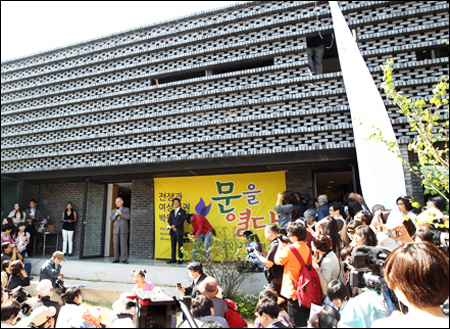Shameless!

The War and Women’s Human Rights Museum in Mapo, Seoul holds an opening ceremony on May 5. It was built to commemorate Korean war-time sex slaves drafted by the Japanese military during colonial rule (1910-1945).
Japan expresses regret over ‘comfort women’ museum
Japan protested to Korea’s foreign ministry earlier this month over the government’s financing a museum in Seoul dedicated to raising awareness of wartime sex slavery under Japanese colonial rule that lasted 36 years.
“Tokyo complained about the government’s support in building the museum and argued it doesn’t help resolve the comfort women issue,” a ministry official told reporters Friday on condition of anonymity.
“We don’t understand why supporting a civic group, which is trying hard to resolve the issue is a problem. We have sent a clear message to Japan that raising these kinds of complaints hinders rather than solves problems,” he said.
On May 7, Takashi Kurai, minister and deputy chief of mission at the Japanese Embassy in Korea, expressed regret over the government providing half a billion won for the building of the War and Women’s Human Rights Museum, which opened two days earlier.
The group raised another 2 billion won to complete the project.
The museum aims to build awareness of the ongoing campaign to demand Japan offer an apology, and the victims’ suffering. The idea was initiated by the Korean Council for Women Drafted for Military Sexual Slavery by Japan in 2003.
The Japanese diplomat also revealed discontent about the Korean gender equality minister’s participation in the museum’s opening ceremony and placing a statute similar to the one erected in front of the Japanese Embassy in Seoul in the museum.
An estimated 200,000 women from Japan’s occupied territories during the Second World War, including Koreans, were forced to provide sexual services for Japanese soldiers during wartime.
Last December, victims and their supporters set up a bronze statue of a girl that symbolizes the wartime atrocity in line with the celebration of their 1,000th weekly protest. The protests, held in front of the Japanese Embassy in Seoul, have taken place since 1992.
Tokyo demanded the removal of the statue, which Seoul rejected.
The unresolved issue of sexual enslavement has long been a bone of contention between the two neighboring countries.
The Japanese government adheres to the position that all compensation in regard to the issue was made under the 1965 Korea-Japan Claims Settlement Agreement that offered some indemnity and loans. Following that logic, it has refused to make an official apology or compensation to the victims of sexual slavery.
However, officials here have stressed that the matter cannot be regarded as fully resolved by the treaty as it was a crime against humanity.
It is becoming an urgent issue for Seoul as the surviving comfort women are growing old and fear they may die before they receive an actual apology or compensation from Tokyo.
At present, there are 61 surviving comfort women. <Korea Times/Chung Min-uck>
























































